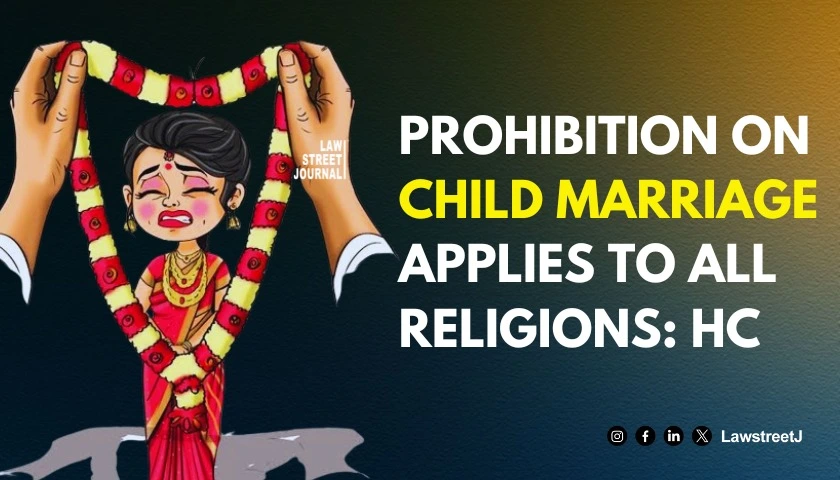Kerala: The Kerala High Court has delivered a landmark judgment affirming that the Prohibition of Child Marriage Act, 2006 applies to all citizens of India regardless of their religion. It issued specific directives to the state government to ensure implementation.
A single-judge bench of Justice P.V. Kunhikrishnan disposed of a criminal miscellaneous case that originated from allegations of child marriage within the Muslim community in 2012.
The petitioners, who belong to the Muslim community, had argued that Muslim personal law permits marriage after puberty, specifically at the age of 15 for girls. However, the court categorically rejected this contention. Justice Kunhikrishnan, delivering the judgment, stated:
“Religion is secondary and citizenship is primary. When the 2006 Act prohibits child marriage, the same is applicable to all, irrespective of religion, whether the parties are Hindus, Muslims, Christians, Parsis, etc. As I observed earlier, it is the duty of every citizen to see that there is no child marriage.”
The case stemmed from a complaint filed by K. Syed Muhammed, a member of the Muslim community, about a child marriage that allegedly took place on December 30, 2012. The court commended this action, noting it as a proud moment for Indian citizens when members of a community come forward against child marriage within their own community.
Also Read: Court sentences 49-yr-old man to 10 years jail in case of child marriage, rape [Read Order]
While acknowledging that some religious personal laws may permit early marriages, Justice Kunhikrishnan emphasized that the Prohibition of Child Marriage Act, as a special law, would override personal laws. The court extensively analyzed various provisions of the Act, including its applicability to all citizens of India both within the country and abroad, as stated in Section 1(2) of the Act.
The court also delved into the duties of Child Marriage Prohibition Officers, as outlined in Section 16(3) of the Act and Rule 3(2) of the Kerala Prohibition of Child Marriage Rules, 2008. These duties include preventing child marriages, collecting evidence for prosecution, creating awareness, and sensitizing communities on the issue.
Further, the court elaborated on the role of Judicial Magistrates, empowering them to take suo motu cognizance of reliable reports of child marriages under Section 13 of the Act. The court stated, “Therefore, if any reliable report or information is received about a child marriage, it is the duty of the Judicial Magistrate of First Class/the Metropolitan Magistrate to suo motu take cognizance based on such reliable report or information.”
The court emphasized the responsibility of citizens and NGOs to report instances of child marriage, as permitted under Section 13 of the Act. It also called upon print and visual media to play a significant role in raising awareness and prohibiting child marriages. “The visual media should also broadcast documentaries and shows on child marriage, creating public service announcements and awareness campaigns, depicting the negative consequences of child marriage in movies and TV shows, interviewing experts, survivors, and activists.”
The court also elaborated on the negative impacts of child marriage, including denial of education, health risks such as infant and maternal mortality, perpetuation of poverty, and emotional and psychological trauma. “Let the children study according to their wishes. Let them travel, let them enjoy life, and when they attain maturity, let them decide about their marriage. In modern society, there cannot be any compulsion for marriage.”
Additionally, the court stated, “Kerala is known for its 100% literacy. But it is sad to hear that, even after the enactment of the Prohibition of Child Marriage Act decades ago, there are allegations of child marriage in Kerala. The saddest thing is that the petitioners herein are trying to justify the alleged child marriage by stating that, as per Mohammedan Law, a Muslim girl enjoys a religious right to marry after attaining puberty irrespective of age, even though the Prohibition of Child Marriage Act applies to all the citizens of India within and beyond India.”
In conclusion, the court elaborated on the need for the prohibition of child marriage in modern society and dismissed the criminal miscellaneous case while allowing the petitioners to present evidence during the trial. It also directed that the trial court should decide the matter uninfluenced by observations in this judgment except on questions of law.
[Read Order]




![Kerala HC Quashes 498A Dowry Harassment Case Against Live-In Partner, Citing Lack of Relative Status [Read Order]](/secure/uploads/2023/08/lj_5693_1057c042-1e57-4e27-8c9e-25af0ec38ec4.jpg)
![Watching porn on mobile: Kerala HC highlights importance of mother cooked meals, outdoor sports [Read Order]](/secure/uploads/2023/09/lj_9155_Parental_supervision_of_mobile_phone_usage.jpg)
![Lakshadweep MP Mohammed Faizal Disqualified from Lok Sabha After Conviction Suspension Plea Rejected by Kerala High Court [Read Notice]](/secure/uploads/2023/10/lj_9640_87b5fd97-0e05-4ff8-9a99-3be1e4446192.jpg)




